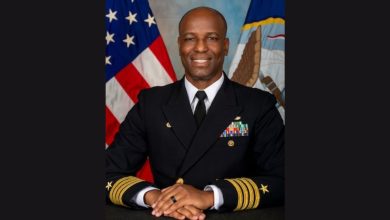Walz faces Republican criticism over timing of military retirement
:quality(70)/cloudfront-us-east-1.images.arcpublishing.com/archetype/SXPV5ISICNCJ5C34U66R4NUYBE.jpg?w=780&resize=780,470&ssl=1)
The Minnesota National Guard last week confirmed that Minnesota Gov. Tim Walz, now the Democratic candidate for vice president, retired from his military career 59 days before his unit received official orders they would deploy to Iraq, undermining recent Republican attacks that Walz abandoned his fellow troops as they headed into a war zone.
The final months of Walz’ service — and the timing of his retirement — came under scrutiny this week when Republican vice presidential candidate JD Vance, an Iraq War veteran and Republican senator from Ohio, accused his opponent of dodging the deployment.
However, information from the Minnesota National Guard and candidacy paperwork Walz filed with the Federal Election Commission when he ran for Congress cast doubt on those accusations, and there is no evidence that Walz timed his departure with the intent of avoiding deployment, The Associated Press reported. The fact-checking publication PolitiFact on Friday described Vance’s statements as “mostly false.”
“When Tim Walz was asked by his country to go to Iraq, do you know what he did? He dropped out of the Army and allowed his unit to go without him,” Vance said at an Aug. 7 news conference in Michigan.
Other Republican elected officials joined in, including Rep. Ronny Jackson, R-Texas, a Navy veteran, who claimed on X that Walz “turned his back on soldiers in his unit.”
The criticism about Walz’s military service started soon after he was named Tuesday as the running mate for Democratic presidential nominee Kamala Harris. During his first campaign rally with Harris, Walz talked about the influence the military had on his life.
“The National Guard gave me purpose. It gave me the strength of a shared commitment to something greater than ourselves,” Walz said. “And just as it did for my dad and millions of others, the GI Bill gave me a shot at a college education.”
According to a summary of his service shared by the Minnesota National Guard, Walz joined the Nebraska National Guard in 1981, and he transferred in 1996 to the Minnesota National Guard, where he served in the 1st Battalion, 125th Field Artillery.
On Aug. 3, 2003, Walz mobilized with the unit in support of Operation Enduring Freedom. Lt. Col. Kristen Augé, the Minnesota National Guard’s state public affairs officer, said the unit supported security missions at various locations in Europe and Turkey. Walz was stationed in Vicenza, Italy, during the deployment, and he returned to Minnesota in April 2004, Augé said.
In February 2005, Walz filed paperwork with the Federal Election Commission and issued a public statement indicating his intent to run for Congress.
The following month, the National Guard informed Walz’s battalion there would be a possible mobilization of 2,000 Minnesota troops to Iraq sometime within the next two years, but no official orders had been announced. In a statement at the time, Walz’s newly-formed campaign said he intended to stay in the congressional race.
In the statement, Walz is quoted as saying, “As command sergeant major I have a responsibility not only to ready my battalion for Iraq, but also to serve if called on. I am dedicated to serving my country to the best of my ability, whether that is in Washington, D.C., or in Iraq.”
Walz officially retired from the National Guard in May 2005. Army Lt. Col. Ryan Rossman, the Minnesota National Guard’s director of operations, said the 1st Battalion, 125th Field Artillery received its alert order for its Iraq deployment two months later, on July 14, 2005.
“The official Department of the Army mobilization order was received on August 14, 2005, and the unit mobilized on October 12, 2005,” Rossman said.
Any communication about the deployment before the official order would be considered an unofficial notice, and would be subject to change, Rossman explained.
According to the unit’s documented history, the battalion trained at Camp Shelby in Mississippi and deployed to Iraq in March 2006. The unit returned in October 2007, according to a congressional resolution.
Walz first faced criticism about the timing of his retirement during his congressional campaign in 2006, and again when he ran in the Minnesota gubernatorial race in 2018.
In the Winona Daily News in November 2006, Walz responded to such criticisms, writing: “After completing 20 years of service in 2001, I re-enlisted to serve our country for an additional four years following Sept. 11 and retired the year before my battalion was deployed to Iraq in order to run for Congress. I’m proud of the 24 years I served our country in the Army National Guard. There’s a code of honor among those who’ve served, and normally this type of partisan political attack comes only from one who’s never worn a uniform.”
Two retired CSMs from the Minnesota National Guard submitted a paid letter to the editor of a Minnesota newspaper in 2018, saying of Walz’s retirement: “When the nation called, he quit.” The letter circulated online this week after Harris named Walz as her running mate.
Joseph Eustice, a veteran who served with Walz, told the New York Times this week that the attacks against Walz were unfounded.
“He was as good a soldier as you’d find, and to have two former sergeant majors say that he wasn’t, it’s just not true,” Eustice told The New York Times. He added that he disagreed with Walz’s politics and likely would not vote for him.
In addition to the timing of his retirement, Walz’s rank was the subject of scrutiny this week, as it’s been before.
While serving in field artillery, Walz held multiple positions, including firing battery chief, operations sergeant and first sergeant, and he “culminated his career serving as the command sergeant major for the battalion,” said Augé.
He held the rank of command sergeant major for seven months, but Walz ended his career as a master sergeant because “he did not complete additional coursework at the U.S. Army Sergeants Major Academy,” Augé said.
Command sergeants major who don’t complete the Sergeants Major Course revert back to their prior rank, she explained.
Walz’s initial biography on the Harris campaign website said he was a “retired command sergeant major.” The campaign later changed the biography to say he “served as a command sergeant major.”
When Walz ran for governor in 2018 and saw similar scrutiny, Capt. Holly Rockow, a public affairs officer for the Minnesota National Guard, told Minnesota Public Radio that it is accurate for Walz to say he served as a command sergeant major, though he did not retire as one.
With Walz’s and Vance’s nominations, the presidential election in November will mark the first in which the ballot includes post-9/11 veterans. Vance served a four-year enlistment as a combat correspondent and deployed to Iraq with the 2nd Marine Aircraft Wing from August 2005 to February 2006.
Neither Vance nor Walz experienced combat. According to records shared by the Marine Corps and National Guard, Vance did not earn a Combat Action Ribbon from the Marine Corps, and Walz did not get a combat badge from the Army — both of which are indicators of direct contact with the enemy.
In his bestselling memoir, Hillbilly Elegy, Vance wrote that he was “lucky to escape any real fighting.” Walz was also careful in his congressional biography to describe his 2003 deployment as being “in support of Operation Enduring Freedom,” rather than describing himself as a veteran of the Afghanistan or Iraq wars.
The Harris-Walz campaign said over the weekend that Walz “misspoke” in a 2018 video clip circulated by the campaign, in which he discussed gun restrictions and said, “We can make sure that those weapons of war, that I carried in war, is the only place where those weapons are at.”
While Walz did handle weapons of war, he did not carry them in a combat zone, the campaign said. The Harris campaign pushed against the GOP’s characterizations of Walz’s service.
“Governor Walz would never insult or undermine any American’s service to this country — in fact, he thanks Senator Vance for putting his life on the line for our country. It’s the American way,” a campaign statement reads.
This story was produced in partnership with Military Veterans in Journalism. Please send tips to [email protected].
Nikki Wentling covers disinformation and extremism for Military Times. She’s reported on veterans and military communities for eight years and has also covered technology, politics, health care and crime. Her work has earned multiple honors from the National Coalition for Homeless Veterans, the Arkansas Associated Press Managing Editors and others.
Read the full article here







